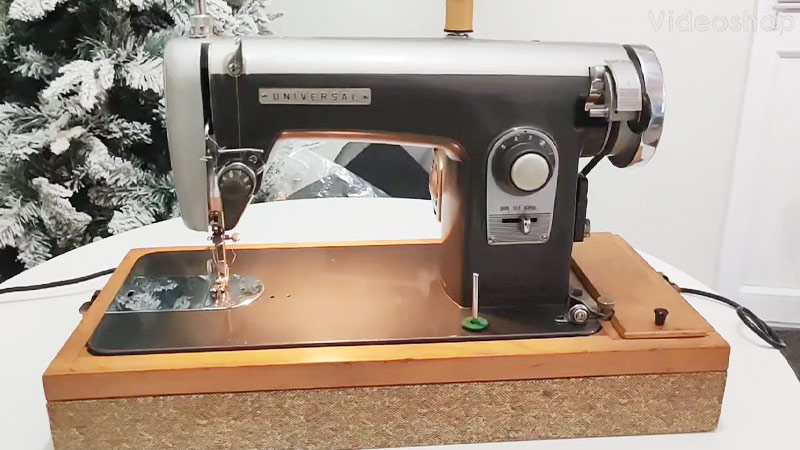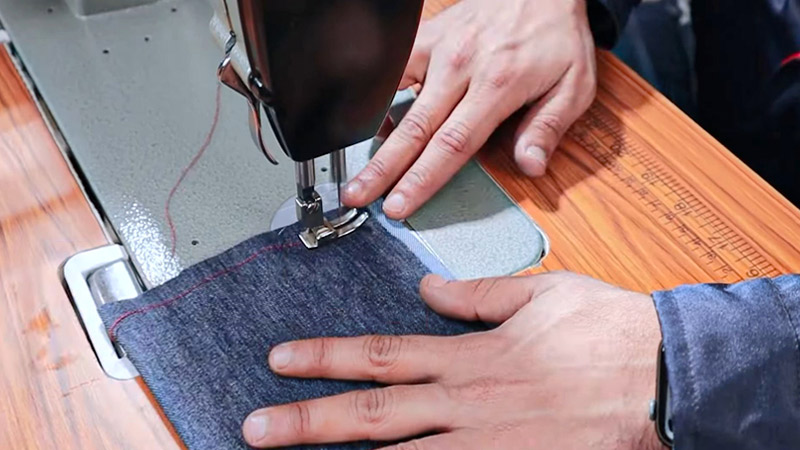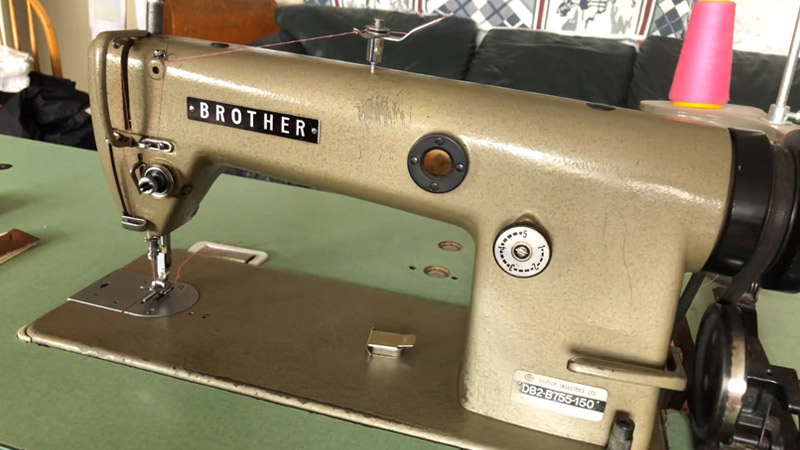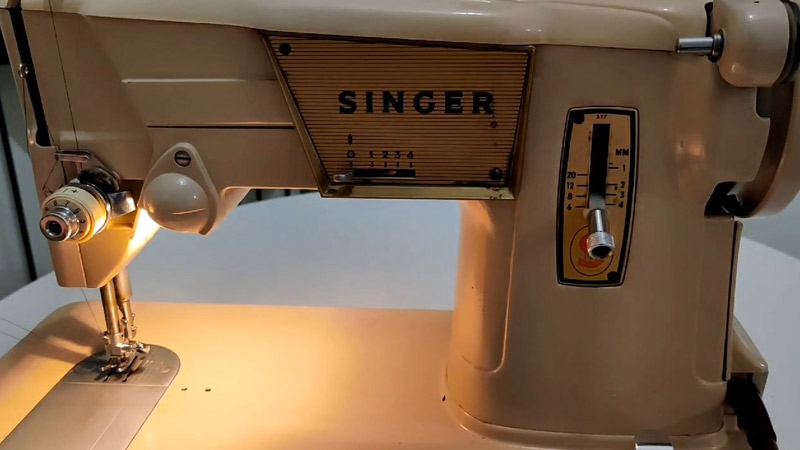The realm of sewing machines extends beyond the domestic into a category known as semi-industrial sewing machines.
Bridging the gap between household and industrial models, a semi-industrial sewing machine holds distinct features tailored for heavier workloads and professional use.
This exploration into “What Is a Semi-Industrial Sewing Machine?” seeks to unravel the characteristics that define this category.
From enhanced durability to advanced functionalities, understanding the nuances of semi-industrial machines opens doors to a broader range of sewing possibilities.
Whether you’re a burgeoning entrepreneur or an avid hobbyist, delving into the specifics of semi-industrial sewing machines unveils a realm where robust performance meets the demands of versatile projects.

Semi Industrial Meaning
“Semi-industrial” typically refers to a level of economic or manufacturing activity that falls between small-scale, artisanal production and large-scale industrial operations.
This term is often used to describe businesses or processes that exhibit characteristics of both traditional craftsmanship and modern industrialization.
In a semi-industrial setting, there may be a blend of manual and automated processes, with a moderate level of mechanization and a focus on efficiency without reaching the scale or complexity of full-scale industrial operations.
This approach allows for flexibility in production, catering to niche markets or specific customization while benefiting from some of the advancements in technology and efficiency associated with larger industrial enterprises.
Semi-industrial practices can be found in various sectors, such as manufacturing, agriculture, and food production, where the aim is to strike a balance between traditional methods and modern advancements.
What Is Semi Industrial Sewing Machine?
A semi-industrial sewing machine bridges the gap between domestic and industrial sewing equipment, offering a versatile solution for users who require a balance of power and precision.
These machines are designed for semi-professional use, providing enhanced features compared to standard home sewing machines while remaining more compact and affordable than full-scale industrial models.
Here are seven key functions that distinguish a semi-industrial sewing machine:
Powerful Motor
A crucial feature of a semi-industrial sewing machine is its robust motor. With increased power, these machines can handle a variety of fabrics, including heavy-duty materials such as denim or leather. This capability ensures consistent stitching even in challenging projects.
High-Speed Stitching

Semi-industrial machines often offer higher stitching speeds compared to regular home sewing machines. This increased speed enhances productivity, making them suitable for users who engage in semi-professional sewing or small-scale production.
Sturdy Construction
The construction of a sewing machine semi-industrial is more durable and robust than typical home machines. This sturdiness allows for prolonged use and can withstand the demands of frequent sewing, contributing to the longevity of the machine.
Versatile Stitching Options
Semi-industrial sewing machines come equipped with a diverse range of stitching options. These may include various straight, zigzag, and decorative stitches, providing users with the flexibility to execute intricate designs and handle different sewing projects with ease.
Large Work Surface
The work surface of a semi-industrial machine is typically more extensive than that of standard home machines. This provides users with ample space to handle larger fabric pieces or projects, offering enhanced convenience and maneuverability during the sewing process.
Automatic Features
Many semi-industrial machines incorporate automatic features such as thread cutting and needle threading. These functions streamline the sewing process, saving time and effort for users engaged in semi-professional or small-scale production work.
Heavy-Duty Feeding Mechanism
Semi-industrial sewing machines often feature a heavy-duty feeding mechanism, ensuring consistent fabric feeding during sewing.
This is particularly beneficial when working with thick or layered materials, contributing to the overall efficiency and quality of the stitching.
A semi-industrial sewing machine combines the strength and features needed for semi-professional applications while maintaining a manageable size and cost.
With a focus on durability, versatility, and enhanced performance, these machines cater to the needs of users seeking a robust sewing solution that goes beyond standard domestic models.
How Does Brother Semi Industrial Sewing Machine Work?

Brother has gained recognition in the sewing machine industry for producing reliable and efficient equipment. Their line of semi-industrial sewing machines exemplifies this commitment to quality and functionality.
Here’s an overview of how a Brother semi-industrial sewing machine works:
User-Friendly Interface
Brother semi-industrial sewing machines are designed with a user-friendly interface, allowing both beginners and experienced sewers to operate the machine with ease.
Clear and intuitive controls, along with informative displays, facilitate efficient navigation through various settings and functions.
Powerful Motor Performance
Brother incorporates a robust motor into their semi-industrial machines, ensuring powerful and consistent performance.
This feature enables the machine to handle a diverse range of fabrics, from lightweight materials to heavy-duty textiles, delivering reliable results across different sewing projects.
Advanced Stitching Options
These machines offer a variety of stitching options, including straight stitches, zigzag stitches, and decorative stitches.
Brother’s semi-industrial models often come equipped with advanced features such as automatic buttonholing and quilting stitches, providing users with creative flexibility and efficiency.
Automatic Thread Cutting
Many Brother semi-industrial sewing machines feature an automatic thread-cutting function. This time-saving feature allows users to trim the thread with precision at the end of each seam, reducing the need for manual intervention and enhancing the overall efficiency of the sewing process.
Large Workspace
Brother understands the importance of a spacious work area, and their semi-industrial machines reflect this by offering a large workspace.
This design accommodates larger fabric pieces and facilitates smooth maneuvering during sewing, contributing to enhanced convenience and versatility.
Precision Feeding Mechanism
Brother sewing machines incorporate a precision feeding mechanism that ensures consistent fabric feeding during sewing.
This feature is particularly valuable when working with intricate patterns or heavy fabrics, as it contributes to the accuracy and quality of the stitched results.
Durable Construction
Brother emphasizes the durability of their semi-industrial sewing machines. Sturdy construction and high-quality materials contribute to the longevity of the machine, making it a reliable choice for users engaged in semi-professional or small-scale production work.
A Brother semi-industrial sewing machine integrates user-friendly features, powerful motor performance, and advanced stitching options to deliver a reliable and efficient sewing experience.
With a focus on precision, durability, and convenience, these machines cater to a wide range of sewing needs, making them a popular choice among both hobbyists and semi-professional users.
What Are Some Best Semi-Industrial Sewing Machine?
For users seeking a balance between domestic and industrial sewing capabilities, several brands offer high-quality semi-industrial sewing machines.
Here are some of the best options from renowned brands like Singer, Janome, and others:
Singer Semi-Industrial Sewing Machine

Singer, a household name in the sewing industry, produces semi-industrial machines that combine reliability and versatility. Their models often feature a robust motor for handling various fabrics, user-friendly controls, and a range of stitching options.
The Singer semi-industrial sewing machines are known for their durability and performance, making them suitable for both hobbyists and those engaged in semi-professional sewing.
Janome Semi-Industrial Sewing Machine
Janome, another reputable brand, offers semi-industrial sewing machines that are praised for their precision and durability. These machines often come equipped with advanced features such as automatic thread cutting, large workspaces, and a variety of stitching options.
Janome’s semi-industrial models are designed to meet the demands of users involved in small-scale production or those who require a versatile and reliable sewing solution.
Semi-Industrial Sewing Machine UK
Various brands cater to the UK market with semi-industrial sewing machines that meet the specific needs of users in the region. These machines typically feature sturdy construction, powerful motors, and a range of functions suitable for semi-professional applications.
Brands available in the UK, such as Brother and Juki, offer semi-industrial models with excellent build quality and performance, making them popular choices for sewers across different skill levels.
Brother Semi-Industrial Sewing Machine
Brother is renowned for producing high-quality sewing machines, and their semi-industrial models are no exception. With user-friendly interfaces, powerful motors, and advanced stitching options, Brother’s semi-industrial machines cater to a wide range of sewing needs.
The durability of construction and precision in feeding mechanisms make these machines reliable choices for users seeking a semi-professional sewing experience.
Juki Semi-Industrial Sewing Machine
Juki is a well-established brand in the sewing industry, offering semi-industrial machines known for their durability and performance.
Juki’s semi-industrial models often feature a combination of advanced features, such as automatic functions and versatile stitching options.
These machines are designed to withstand heavy use and provide reliable results, making them suitable for users engaged in semi-professional sewing projects.
Brands like Singer, Janome, Brother, and Juki offer some of the best semi-industrial sewing machines on the market.
These machines blend power, precision, and durability, providing users with versatile tools for a range of sewing projects, from domestic to semi-professional applications.
FAQs
How does a semi-industrial sewing machine differ from a domestic one?
Unlike domestic machines, semi-industrial sewing machines possess a more robust motor, enhanced durability, and a larger workspace. These features empower users to tackle a broader range of fabrics and engage in semi-professional sewing tasks.
Can a semi-industrial sewing machine handle heavy fabrics?
Yes, one of the key strengths of a semi-industrial sewing machine is its ability to handle heavy fabrics, such as denim or leather, thanks to its powerful motor and sturdy construction.
What advantages do semi-industrial sewing machines offer?
Semi-industrial sewing machines provide several advantages, including higher stitching speeds, a variety of stitching options, automatic features like thread cutting, and a larger work surface. These features contribute to increased productivity and efficiency.
Who can benefit from using a semi-industrial sewing machine?
Semi-industrial sewing machines are beneficial for a diverse range of users, including hobbyists looking for advanced features, small business owners engaged in custom production, and individuals requiring a versatile sewing solution that goes beyond basic domestic machines.
Are semi-industrial sewing machines suitable for beginners?
Yes, many semi-industrial sewing machines are designed with user-friendly interfaces, making them accessible for beginners. The combination of durability, ease of use, and advanced features allows users to grow their skills over time, making these machines a suitable choice for sewers of all levels.
Conclusion
A semi-industrial sewing machine encapsulates the best of both domestic and industrial worlds. This versatile category caters to individuals seeking sturdier construction, increased speed, and enhanced capabilities for a diverse array of fabrics.
Whether you aspire to launch a small-scale production or desire a machine that can withstand prolonged usage, a semi-industrial sewing machine is designed to meet these needs.
By grasping “What Is a Semi-Industrial Sewing Machine?” and recognizing its unique attributes, you gain insight into a valuable tool that empowers ambitious creators and professionals alike, blending efficiency with durability in the world of sewing.
Leave a Reply